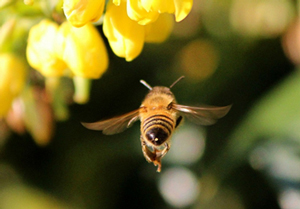

 |
||
|
::: Interdisciplinary Efforts: NTU research team uncovers mystery of disappearing bees |
||
|
Why are bees disappearing? This conundrum has been baffling scientists for decades, and there is still no absolute explanation with regards with the matter. The honeybee industry makes up NT$ 2.3 billion of the nation’s annual output value, and bee pollination indirectly contributes NT$ 20 billion to NT$ 30 billion of the nation’s overall agricultural production each year. This is just in Taiwan, so imagine the widespread threat the decline in bees imposes globally. To address the problem, an interdisciplinary research team in National Taiwan University was formed, and after years of collaborative efforts, a breakthrough was announced at a press conference on April 14, 2014. Previous studies have confirmed that the use of insecticide has led to the mass disappearance of bees, a phenomenon known as Colony Collapse Disorder. Building upon this premise, the research led by Professor En-Cheng Yang (楊恩誠) of the Department of Entomology focused on the relation between the bee’s behavior and an insect neurotoxin known as imidacloprid, a common substance in nicotine insecticide. According to the findings, neurological changes to the insect’s learning ability, rather than its high fatality rate, which had been the focus of previous studies, are the main cause for this large-scale disintegration of the ecosystem. The team conducted an experiment to have a better understanding of how imidacloprid influences the bee. The experiment found that when a worker bee ingests 50 ppb (part-per-billion) of the neurotoxin, it instantly loses its ability to return to its hive, affecting the colony’s ability to reproduce. As the dosage increases, the number of intoxicated bees also grows.  The NTU research shows that intoxicated bees have lost their learning and cognitive abilities, preventing them from finding their way home. However, when the same experiment model is applied to the larvae, an astonishing result occurs. According to Professor Yang, imidacloprid has little effect on a larva's fatality rate, even when dosages that are fatal to imago (adult) bees are being applied. Although the larva is still able to go through capping, pupa, and metamorphosis, dosages of as little as 10 ppb can affect the larva’s learning ability after metamorphosis. In other words, Professor Yang’s research shows that the intoxicated bees have not mysteriously disappeared; they have simply gone lost as a result of neurological changes to their learning abilities and cognitive capacities. This conclusion is of great significance as it is the first to prove that imidacloprid has a detrimental effect not only on bees, but also on larvae. In addition, the research further substantiates how imidacloprid residue of as little as 10 ppb can damage the bee’s neurological system, which in turn, is the likely reason of their mass and rapid rapid decline.  Research team led by Professor En-Cheng Yang (楊恩誠, second right), NTU President (third right), and Academic Vice President (third left) posing at the press conference on Apr 14, 2014. A special tracking device was created for the experiment, and interdisciplinary efforts were put into the design, construction, and execution of the equipment. Professor Ta-Te Lin (林達德) of the Department of Bio-industrial Mechatronics Engineering combined the laser track-mark technology with the image recognition system to help track the bees’ activities, while Professor Huei Wang (王暉) of the Department of Electrical Engineering also provided his expertise in radar and other advanced tracking technologies. Professor Joe-Air Jiang (江昭皚), also from the Department of Bio-industrial Mechatronics Engineering, used infrared technology to monitor the colony’s activities and the bee’s location to have an accurate account of the experiment. Professor Yuan-Tay Shyu (徐源泰) of the College Bioresources and Agriculture also played essential role during the process of the research. The research, which confirms that non-lethal doses of insecticide also affect adult bees, has received widespread attention from the international community. The team’s collaborative efforts of using interdisciplinary, cutting-edge technology are also a novel working mode in the study of bees across the globe. In the future, NTU will continue to invest in the topic with the aims to contribute to the maintenance of ecological balance. |
||
No. 1, Sec. 4, Roosevelt Road, Taipei, 10617 Taiwan(R.O.C.)
Phone: +886-2-3366-3366 Fax: +886-2-2362-7651